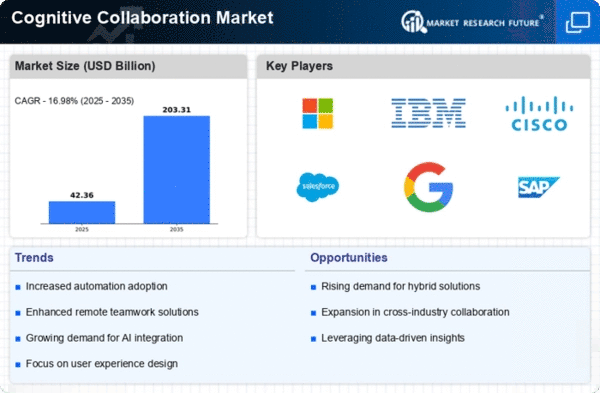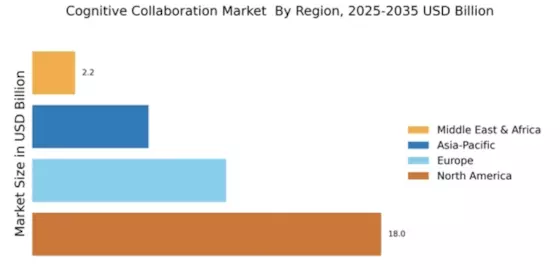Market Growth Projections
The Global Cognitive Collaboration Market Industry is poised for remarkable growth, with projections indicating a rise from 37.6 USD Billion in 2024 to 203.3 USD Billion by 2035. This trajectory suggests a robust expansion driven by various factors, including technological advancements, increased remote work, and the growing importance of collaboration tools. The anticipated CAGR of 16.59% from 2025 to 2035 reflects the industry's potential to adapt to changing workplace dynamics and evolving organizational needs. As businesses continue to prioritize collaboration and communication, the market is likely to witness significant investments in innovative solutions that enhance productivity and foster teamwork.
Growing Focus on Employee Engagement
A growing focus on employee engagement is reshaping the Global Cognitive Collaboration Market Industry. Organizations recognize that engaged employees are more productive and contribute positively to company culture. As a result, businesses are investing in cognitive collaboration tools that promote teamwork, communication, and knowledge sharing. This trend is likely to accelerate the market's growth, with a projected CAGR of 16.59% from 2025 to 2035. By fostering an environment where employees feel valued and connected, companies can enhance collaboration and drive innovation. The emphasis on engagement underscores the need for tools that facilitate meaningful interactions and support diverse work styles.
Emergence of Collaborative Workspaces
The emergence of collaborative workspaces is reshaping the Global Cognitive Collaboration Market Industry. These environments are designed to foster creativity, innovation, and teamwork, encouraging employees to collaborate more effectively. As organizations recognize the value of collaborative spaces, there is a growing demand for cognitive collaboration tools that support these initiatives. This trend is likely to drive market growth, with projections indicating a CAGR of 16.59% from 2025 to 2035. Collaborative workspaces promote interaction and knowledge sharing, aligning with the evolving nature of work. Companies are increasingly investing in technologies that enhance collaboration within these spaces, thereby improving overall productivity and employee satisfaction.
Integration of Artificial Intelligence
The integration of artificial intelligence (AI) into cognitive collaboration tools is a pivotal driver for the Global Cognitive Collaboration Market Industry. AI enhances the functionality of collaboration platforms by providing intelligent insights, automating routine tasks, and facilitating data-driven decision-making. This technological advancement is expected to contribute significantly to the market's expansion, with projections indicating a growth to 203.3 USD Billion by 2035. Organizations are increasingly leveraging AI capabilities to improve user experiences and foster innovation. The ability to analyze vast amounts of data in real-time allows teams to collaborate more effectively, thereby driving productivity and efficiency across various sectors.
Rising Adoption of Cloud-Based Solutions
The rising adoption of cloud-based solutions significantly influences the Global Cognitive Collaboration Market Industry. Cloud technology offers scalability, flexibility, and cost-effectiveness, making it an attractive option for organizations seeking to enhance collaboration. As businesses increasingly migrate to cloud platforms, the market is poised for substantial growth, with expectations of reaching 37.6 USD Billion in 2024. Cloud-based cognitive collaboration tools enable real-time access to information and resources, facilitating seamless communication among teams regardless of location. This trend reflects a broader shift towards digital transformation, as organizations leverage cloud capabilities to improve operational efficiency and foster collaboration.
Increased Demand for Remote Work Solutions
The Global Cognitive Collaboration Market Industry experiences heightened demand for remote work solutions, driven by the need for effective communication and collaboration tools. As organizations adapt to flexible work environments, the market is projected to reach 37.6 USD Billion in 2024. This shift necessitates platforms that facilitate seamless interaction among distributed teams, enhancing productivity and engagement. Companies are increasingly investing in cognitive collaboration technologies to streamline workflows and improve decision-making processes. The rise of remote work has underscored the importance of these tools, positioning the industry for substantial growth as businesses seek to optimize their operations in a digital-first landscape.

















